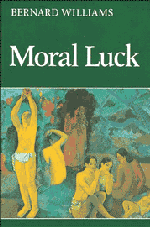Book contents
- Frontmatter
- Contents
- Preface
- Acknowledgements
- 1 Persons, character and morality
- 2 Moral luck
- 3 Utilitarianism and moral self-indulgence
- 4 Politics and moral character
- 5 Conflicts of values
- 6 Justice as a virtue
- 7 Rawls and Pascal's wager
- 8 Internal and external reasons
- 9 Ought and moral obligation
- 10 Practical necessity
- 11 The truth in relativism
- 12 Wittgenstein and idealism
- 13 Another time, another place, another person
5 - Conflicts of values
Published online by Cambridge University Press: 05 June 2012
- Frontmatter
- Contents
- Preface
- Acknowledgements
- 1 Persons, character and morality
- 2 Moral luck
- 3 Utilitarianism and moral self-indulgence
- 4 Politics and moral character
- 5 Conflicts of values
- 6 Justice as a virtue
- 7 Rawls and Pascal's wager
- 8 Internal and external reasons
- 9 Ought and moral obligation
- 10 Practical necessity
- 11 The truth in relativism
- 12 Wittgenstein and idealism
- 13 Another time, another place, another person
Summary
Isaiah Berlin has always insisted that there is a plurality of values which can conflict with one another, and which are not reducible to one another; consequently, that we cannot conceive of a situation in which it was true both that all value-conflict had been eliminated, and that there had been no loss of value on the way. To have insisted on these truths is one of the conspicuous services that Berlin has rendered to a sound and humane conception of social thought.
In Berlin's own thought, these truths are associated with the foundations of liberalism. The history of that movement itself shows that the consequences of these views need not be quietist or conservative. Yet while this has been so, there does remain a problem about the relation of this kind of pluralism to action, a problem at least for a modern, developed, and relatively liberal society. Even there, it is of course true that the business of reaffirming and defending the plurality of values is itself a political task, one to which Berlin's writings make a permanent contribution. But more is needed, if the pluralist is not to spend too much of his time as a rueful spectator of political change which is itself powered by forces which either have nothing to do with values at all, or else express value-claims more exclusive than the pluralist himself would admit.
- Type
- Chapter
- Information
- Moral LuckPhilosophical Papers 1973–1980, pp. 71 - 82Publisher: Cambridge University PressPrint publication year: 1981
- 65
- Cited by



